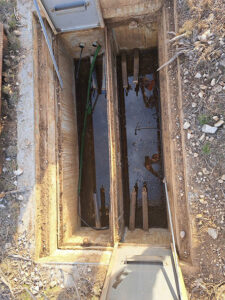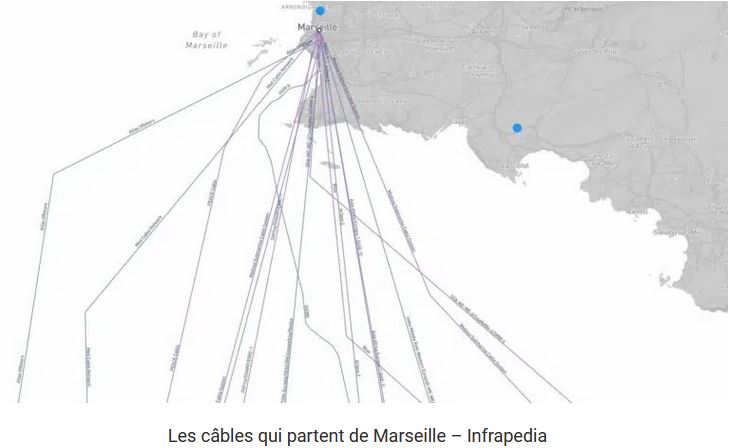Marseille : and one beautiful night the internet was cut off
[Update: According to specialized sites of the industry, this coordinated sabotage struck not only several international cables in Marseille (the Amsterdam-Paris-Lyon-Marseille line, the line coming from Barcelona and the one going to Milan), but also another one in Aix-en-Provence, affecting the delivery of internet via the submarine cables which leave the port of Marseille to serve Asia.
If the national press has for the moment released sparse information so as not to sound the alarm and avoid giving bad ideas, several impacted Internet operators have nevertheless had to publish “incident tickets” following these sabotages. Cogent (North American manager of huge fiber optic networks carrying 17% of the world’s Internet traffic) said for example that one of the attacks occurred “on a private site of the water company of Marseille, which is also a major hub for fiber cables for various operators”, and the French data center manager OVH said in particular that “the cut has impacted the link between Marseille and Singapore” by “saturating all the Internet traffic coming from the United States and Europe” to this state…]
Marseille: Free and SFR victims of an “act of vandalism”, thousands of customers deprived of Internet
Le Parisien & Free (for the pictures!), October 19, 2022
Thousands of French people are without an Internet connection. Telecom operators Free and SFR were victims on Wednesday [19  October] of an “act of vandalism” on their fiber infrastructure in the Marseille area, resulting in “severe disruptions” to the Internet network.
October] of an “act of vandalism” on their fiber infrastructure in the Marseille area, resulting in “severe disruptions” to the Internet network.
“An act of vandalism on our fiber infrastructure has led since last night to major service disruptions (degradation of service and fixed/mobile bandwidth) in the Marseille area. The acts of vandalism took place in various remote points simultaneously,” said the operator Free on its Twitter account.

“Our teams have been mobilized since 3 a.m.,” it added, indicating that “legal action will be taken,” without saying more. The operator SFR confirmed that it was also affected by the cut of a “long-distance network” in the southeast region.
“Teams are on site, operations have begun” to restore traffic, said the company. At the end of the day, the site Zone ADSL had counted more than 4,600 breakdowns on the fixed Internet in France in the last 24 hours, disrupting mostly customers of the operator Free and SFR. When contacted, Orange and Bouygues Telecom indicated that they were not victims of disruptions.
Malicious acts of an unprecedented scale on the national fiber optic network in France had led in April to slowdowns and cuts in Internet access in several major cities, including the east of the country.
An investigation was opened by the Paris public prosecutor’s office for “deterioration of property likely to affect the fundamental interests of the nation”, “obstruction of an automated data processing system” and “criminal association”. At the heart of the global submarine cable network, Marseilles is one of the main Internet hubs that host many of France’s major data centers.
New Internet infrastructure sabotage in France
LeMagIT, October 20, 2022 (excerpt)
New sabotage on the French backbone links. During the night of  Monday 17 to Tuesday 18 October, at around three o’clock in the morning, a segment of the backbone fiber that carries the Western Internet from northern Europe to Marseille was cut off at Aix-en-Provence. According to the first elements of the investigation, all the criminals had to do was lift the cast iron cover of a telecom chamber dug under the road and sever the ducts that contain fiber optic cables.
Monday 17 to Tuesday 18 October, at around three o’clock in the morning, a segment of the backbone fiber that carries the Western Internet from northern Europe to Marseille was cut off at Aix-en-Provence. According to the first elements of the investigation, all the criminals had to do was lift the cast iron cover of a telecom chamber dug under the road and sever the ducts that contain fiber optic cables.
It was not until the following Thursday morning that the information was revealed by Zscaler, a U.S. provider of secure cloud access platforms. Its statement suggests that the cut impacts the delivery of Internet via submarine cables that leave the port of Marseille to serve Africa, the Middle East and Asia:
“A major cable outage in the south of France has impacted the main submarine cables providing connectivity to Asia, and potentially other parts of the world. This outage is likely to cause packet loss and unusual latency for websites and applications that traverse the affected links,” the U.S. vendor writes.
Zscaler also mentions a sabotage in three places around Marseille; on the backbone segment coming from Lyon (the Amsterdam-Paris-Lyon-Marseille axis is used to connect the submarine cables in the Atlantic to the submarine cables that leave from the Mediterranean and run along the sides of the Indian and Pacific Oceans), on the one from Madrid (which serves as a relay for other cables crossing the Atlantic), and on the one to Milan (which serves Southeast Europe).
However, it seems more likely that traffic to Madrid and Milan was affected by a single cut, on the fibers coming from Lyon.
When asked by LeMagIT, Interxion, owner of the Marseilles data centers that link the terrestrial and submarine backbone segments, said that this act of sabotage is particularly worrying, if only because it shows the fragility of the infrastructure in France. “Thousands of people in France, subcontractors of operators, staff of operators have access to the plans of the backbone fiber routes. On these routes, you have an opening every 500 meters, very rarely locked, to access the ducts.”
Who sabotaged the backbone?
The sabotage of backbone fibers – the backbone of the Internet – is not a first. Last April, three backbone fibers converging on Paris were literally cut to the south, east and north of the capital, at twenty minute intervals. The telecom providers questioned at the time rejected the thesis of an accident and spoke of coordinated operations.
However, the authorities still do not seem to have found the culprits of these sabotages. An enemy power against Western infrastructures? Activists at war with digital technology (in 2021, 341 acts of vandalism were recorded against 5G towers)? Or perhaps subcontractors in retaliation for too many unpaid bills?
This sabotage, like the one in April, mainly impacted the networks of national operators SFR, Free and Bouygues. But not that of Orange. In both cases, the severed ducts had been deployed between 1999 and 2002 by subcontractors of Louis Dreyfus Communication (LDCom), which sold all its activities to SFR in 2007. The ducts that SFR inherited and continues to maintain are also leased to Bouygues, Free, Verizon and Colt. Orange has deployed its own network of terrestrial ducts.
via: sansnom Translated by Act for freedom now!
 October] of an “act of vandalism” on their fiber infrastructure in the Marseille area, resulting in “severe disruptions” to the Internet network.
October] of an “act of vandalism” on their fiber infrastructure in the Marseille area, resulting in “severe disruptions” to the Internet network.



 Monday 17 to Tuesday 18 October, at around three o’clock in the morning, a segment of the backbone fiber that carries the Western Internet from northern Europe to Marseille was cut off at Aix-en-Provence. According to the first elements of the investigation, all the criminals had to do was lift the cast iron cover of a telecom chamber dug under the road and sever the ducts that contain fiber optic cables.
Monday 17 to Tuesday 18 October, at around three o’clock in the morning, a segment of the backbone fiber that carries the Western Internet from northern Europe to Marseille was cut off at Aix-en-Provence. According to the first elements of the investigation, all the criminals had to do was lift the cast iron cover of a telecom chamber dug under the road and sever the ducts that contain fiber optic cables.